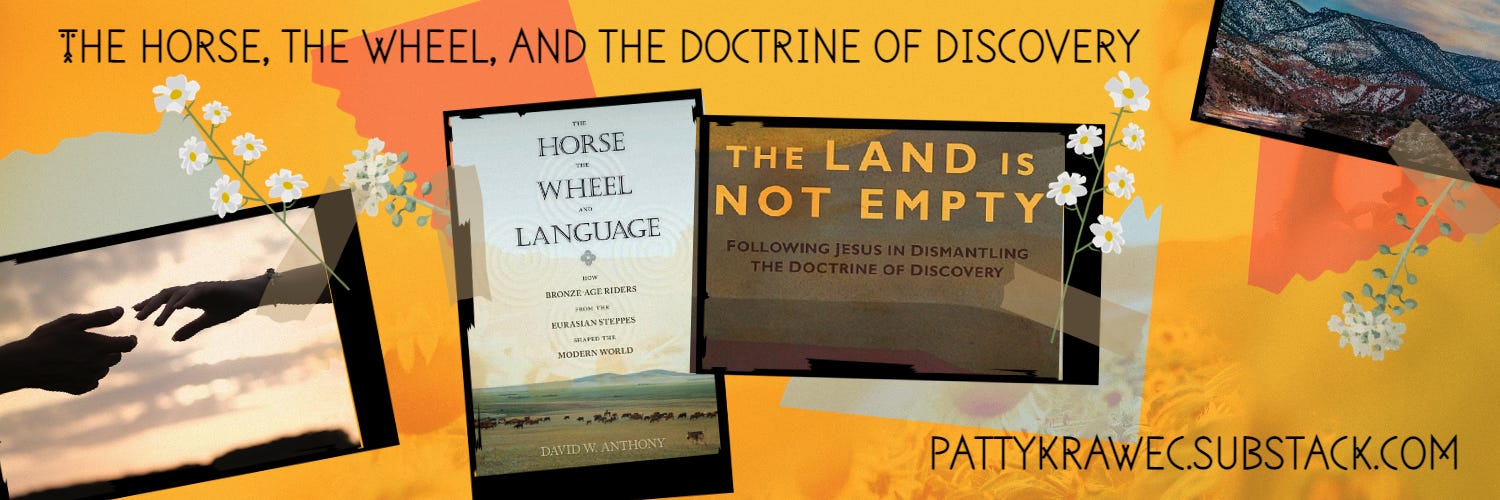I was having a difficult time coming up with two books to talk about, to put together and see what came out of it and so I did what I did last time my brain wouldn’t work. I turned to Twitter. This time instead of searching a word I had a poll and offered people choices between books and tweeps wanted to hear what The Horse, The Wheel, and Language and The Land is Not Empty might have to say to each other. Boy was that a good idea. Thanks tweeps!

The Horse, The Wheel, and Language is a book about the deep past. Through the alchemy of linguistics and archeology David W. Anthony reconstructs the possible cultures of the bronze age Steppe culture, which is pretty remarkable because the proto-Indo-European language he writes about hasn’t existed for thousands of years and it was never written down. Linguists find scraps of it in the descendant languages and then work backwards to reconstruct roots and forms and I’m not going to attempt an explanation of how they do that. You’ll just have to read the book for yourself, or listen to this episode of Tides of History where Patrick Wyman talks about the book.
On the other hand, The Land is Not Empty is a very contemporary book. Sarah Augustine, a Tewa descendant, writes about her own experiences as an Indigenous person in working to dismantle the doctrine of discovery in the church and government structures. The book is subtitled “Following Jesus in dismantling the doctrine of discovery” and it is geared towards the church, but don’t worry. Even if you have never set foot in a church this book will have something to say to you. You are organized somewhere, you belong to something. And you can use the principles she offers to work against this DOD which underpins basically everything about what is now called the Americas.
So I looked through my notes and what I found in Anthony’s book was a discussion of migration and how language and technology are part of the way that migrating cultures impose control over those who are already living in a place. See, it isn’t just the doctrine of discovery that is the problem. It isn’t like the pope could rescind that collection of papal bulls and somehow things would be different. Nothing would be different because that’s a legal structure that has now, through the Marshall decisions and others, become embedded in US and Canadian law.
Borders exist in two ways. For nation-states they exist as hard boundaries that may be mapped out according to latitude and longtitude or difficult to pass geography, like the boundary between Canada and the US follows the 49th degree parallel until it gets to the Great Lakes and then follows the water to the Atlantic Ocean. But frontier borders are different. They are layers of overlapping claim, or what Indigenous legal scholar Alan Mills calls thickening gradients in our lived relationships. There is a transitional zone, dynamic open space in which both societies have varying degrees of claim and presence.
The peoples of what are now the Americas lived with primarily frontier borders although geographic boundaries certainly existed as well. Europe, however, was developing the fixed borders of nation-states and that was a problem, both for diverse peoples in Europe as well as in the world they called new. Because when these European states arrived in the Americas with their entitlement to land tucked beneath their arms they disregarded the boundaries that already existed and mapped their own boundaries on top of us. The various treaties that would eventually carve up the continents were never made with our input and so, as it is said, the borders crossed us which means that these new states had a lot of internal frontier-style borders to deal with.
Anthony’s book describes how states do that because the people he is writing about basically colonized most of Eurasia 6,000 years ago and, as his subtitle says, shaped the modern world. Augustine’s book describes the much more recent history of the colonization of the Americas and how churches, and really any organization, can look at their own practices and confront both the legal/policy structures of the doctrine of discovery as well as the mechanisms that Anthony discusses because it turns out that the same mechanisms and strategies are at play.
Peoples who are separated by frontier borders have their own languages, their own cosmologies, their own way of understanding their place in the world and communicating that to each other. So it stands to reason that one very effective way for nation-states to build unity in the community is to impose a common language and a common religion on everyone. This can be done gradually over time, Anthony describes market practices and relationships that eventually level out the earlier instability of new migrations into a space, but it can also take place suddenly and with violence as in residential schools and laws forbidding Indigenous religious practices.
There are all kinds of bridging or binding practices that Anthony describes to manage relationships across borders, creating and cementing them, and thereby spreading the language, culture, and cosmology of the migrating people. Not all of them are rooted in violence and control. He writes about migrations sometimes creating “islands of authority” that displace but do not eliminate the original peoples that sound much like Mills’ gradients of lived relationship. Cultural and linguistic shift will happen, but there is a difference between diffusion and imposition.
Think about marriage. In some societies it is used to strengthen relationships between communities. In Anishinaabe culture the woman would go live with her husband and their children would take on his clan identity but she retains her own because her relationship to her clan is important in the web of relationships that make up Anishinaabe society. And if things didn’t work out she could just go home at the next clan gathering. But when we are talking about colonization, out marriage doesn’t strengthen relationships as much as impose new ways of doing things because, as Anthony points out, women who marry into patriarchal societies (and are then isolated from their own society) become “hyper correct imitators.” Matoaka, who you may know as Pocahonatas, is a good example of that. Kidnapped by the English she eventually converted and married John Rolfe. It is not some great love story. It is a kidnapped woman who became more English than the English in order to survive.
Hyper correct imitators also works for migrants who move into authoritarian societies like the one we all live in. Think about how quickly many Muslims will insist that they are patriotic Americans or Canadians when they are viewed with suspicion because of the actions of Muslim states across an ocean. I think about my own maternal family and my aunt’s decision to change her name from Natasha to Nancy, her siblings did not do this but they were blessed by names that were more innocuous, less obviously other.
So now we turn to Augustine and her insistence that despite what several popes and then US Supreme Courts and many others have said, the land was not in fact empty and neither were the people. What do we do about all this? Ok, so it’s all hecked up using the same basic strategies that Anthony notes worked 6,000 years ago. What do we do? Augustine has some ideas.

She begins from a place of profound hope. She says that life is inevitable. The forces of darkenss that are invested in death are doomed. And you see this if you look closely enough. Flowers pushing through pavement. Raccoons getting into raccoon proof garbage bins. She talks about a gospel that is good news for the poor, freedom for prisoners, sight for the blind, and liberation for the oppressed. Not as a metaphor, but literally. Actually. What if the church, instead of working with the colonial state to impoverish, imprison, disable, and oppress turned itself around and worked against those things? What if the church stopped seeing those things as metaphors for our internal condition and saw them as material conditions that can be changed?
Because the church has always been part of the colonial project. It drove it right from the beginning and framed colonization in terms of the Great Commission. It ran praying towns and schools, enacted legislation, shaped policy. It erased and consumed and put everyone in little Jesus boxes made of ticky tacky and they all came out the same.
Those things that the church was supposed to do, she points out, have to do with dismantling or challenging authority, not being authority. So instead of imposing language and religion on others, the church should be creating those islands of authority from which relationships, not power, diffuse outward. Ceding the power they have grasped, which was never meant to be theirs, to the people they have harmed and then live in balanced relationships. Choose people rather than the state, because wow. Imagine if all the power contained in the church was directed towards life and not the mechanisms of death that are imposed by the state.
And your organization can do that too. What kind of relationship do you have with Indigenous people? Does your organization do a land acknowledgement? What impact does that have on policy decisions? Have you looked at how your field impacts Indigenous peoples?
And this part is important. When you are doing consultations, are you listening to the ones who disagree with you? The ones who oppose you and say you cause harm? Because they are the ones you should be listening to, not the ones who agree with you. Those ones may be those hyper correct imitators that are just trying to survive. Listen to the ones who aren’t afraid to point out harms.
Living in right relationship with Indigenous people means balanced power. It doesn’t mean proportional power, like there’s 94% of you and 6% of us and so you get 94% of the power. It means balancing the power so that we are equals. It means islands of authority that diffuse outward into the thickening gradients of lived relationship. It means challenging the structures of authority and that is good news because it isn’t about you feeling guilty for being white or Christian or whatever. It is about our participation in systems of death and the possibility of choosing life, choosing to work against those systems.
Because life is, as the saying goes, inevitable.

Thanks for reading! This is a free post and it really helps when you share your thoughts on this and other essays in whatever social media platform you use. Don’t forget to tag me (pattywbk on Instagram or @gindaanis on Twitter)
Next week I’ll give the runners up a shot and see what happens when Jesus and John Wayne and God is Red have a conversation.
